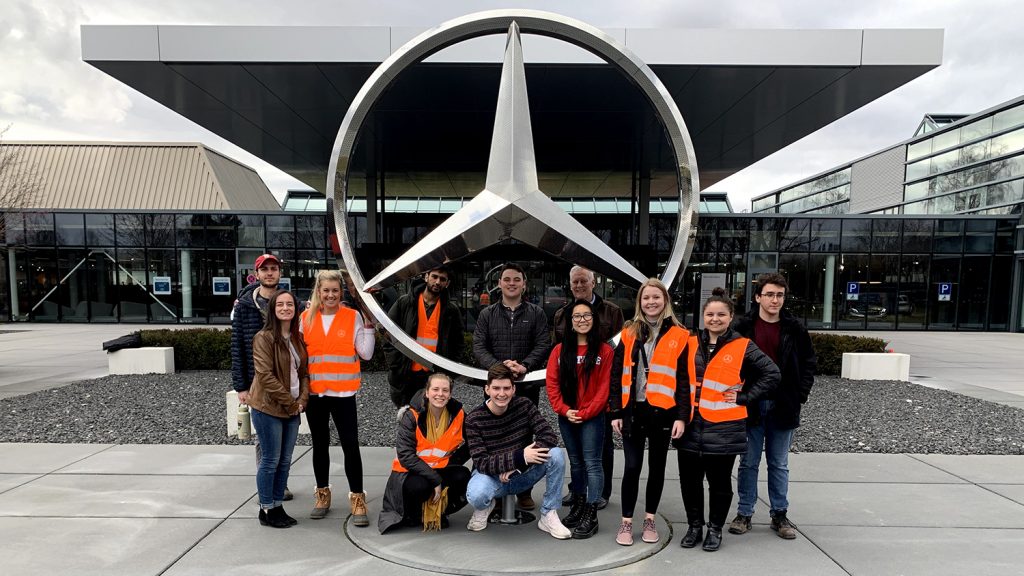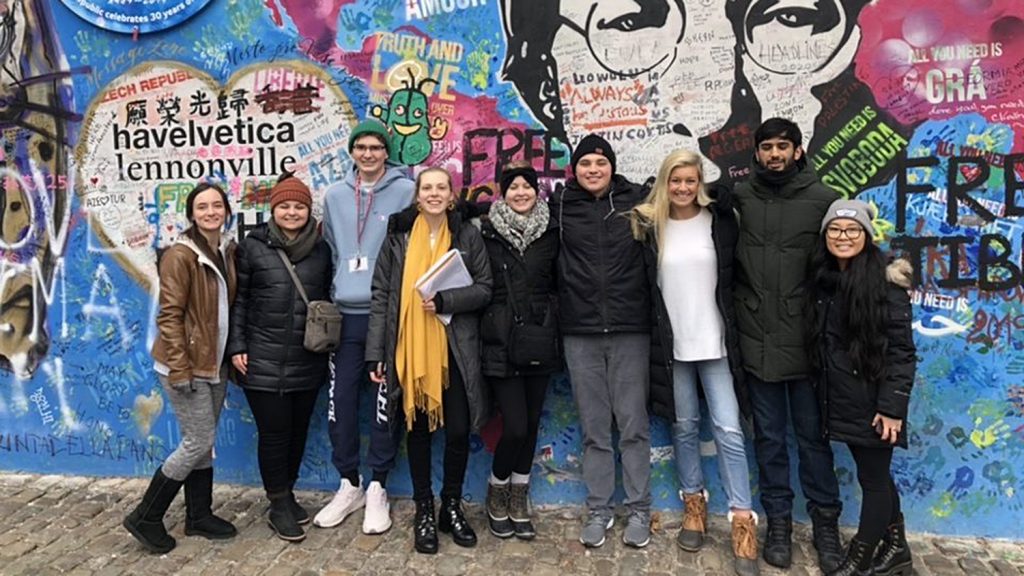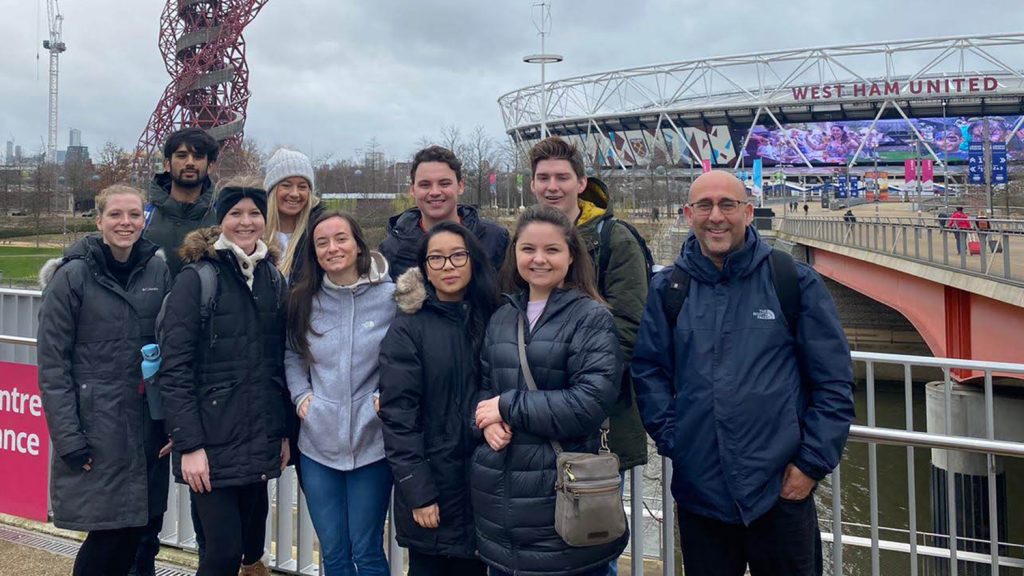Eye of the Storm

Torrential rains driven by gale-force winds rattled the windows of Holborn Tower, a landmark office building on a narrow street near the British Museum in London. But storm clouds of another sort were on the minds of executives inside Team England’s fifth-floor suite in February.
The organization represents England in the quadrennial Commonwealth Games, an international athletics competition slated to be held in Birmingham, the country’s second-largest city, in 2022.
Anxious executives had their eye on Brexit, Britain’s chaotic exit from the European Union, which is threatening to upend planning for the games and drive up its cost, already projected to top $1 billion. Adding another level of uncertainty was news of an emerging coronavirus outbreak in China.
Arriving in London on the tailwinds of Storm Ciara — which brought high winds, heavy rainfall and widespread flooding to the UK — nine NC State undergraduates got the chance of a lifetime when they were invited to Holborn Tower for a meeting with Team England’s top management.
“I can’t think of an industry that has been more impacted by COVID-19 and Brexit than the sports and tourism industry,” says Jason Bocarro, professor of parks, recreation and tourism. “For the students, it was a unique experience in a unique setting.”
It was just one stop on an eight-week journey that began in January at NC State’s European Center in Prague. From there, the students traveled to London, then on to the industrial town of Reutlingen, at the foot of Germany’s Swabian Mountains. During the whirlwind tour, the students completed 12 credit hours toward a minor in Global Leadership and Team Decision-Making. They wrapped up a capstone project after returning to the United States in March.
The global leadership minor is a new academic offering available to students across the university that combines classroom instruction and hands-on experience under the guidance of faculty from NC State and partner institutions in host cities overseas. In each city, students got behind-the-scenes access to leading business and industry sites, including Kontoor Brands’ distribution center for Wrangler and Lee apparel in Prague, Big Four accounting firm Ernst & Young’s headquarters in London and the Mercedes-Benz Logistics Center in Reutlingen.
Think of it as study abroad on steroids.

New Dimensions
For Sarah Roskam, a sophomore pursuing a dual degree in international studies and economics, the trip brought daily revelations.
“Going from Raleigh to the Czech Republic, the culture shock was huge,” she says. “Then, going from Prague to London added another dimension. In each country, we put information through another filter. Each week brought another dimension, another layer, another way to look at decision-making.”
Bocarro, a London native, organized and taught the London leg of the trip, which focused on leadership and decision-making in the recreation and tourism industries. In addition to visits with Ernst & Young and Team England, he led the students on excursions to the five-star Stafford Hotel and the European Tour Operators Association.
“The students spent the day with the senior leadership teams at these organizations, and they got so much out of it,” Bocarro says. “I couldn’t have had a better group of students than this group. They were inquisitive, respectful and a joy to be around. It made the experience incredible.”
An accident of history gave the students a front-row seat to corporate decision-making just as the first wave of COVID-19 was hitting European countries.
“The world is providing us with many, many different challenges,” Bocarro says. “If we don’t have leaders who are able to rise to those challenges and guide their organizations, their employees and themselves through that, then we’re in trouble.”

Roskam’s immersion in the theory and practice of leadership helped her appreciate the complexities of the discipline.
“We learned how to be a leader in every situation, and what being a leader means,” she says. “That’s different from saying, ‘I’m the leader; follow me.’ It’s all about listening and receiving input.”
Hannah Ziegler, a senior majoring in fashion and textile management, saw this principle in action at a car manufacturing plant in Prague, where management listened to employees’ suggestions for improving their work environment.
“Employees on one part of the production line realized that it would be a lot easier if they could lower the cars and work from a sitting position to prevent neck strain,” she says. “The fact that the company was set up to hear those needs and then get them addressed was really cool.”
Another innovation she saw on the factory floor was a practice not common in U.S. plants: organizing employees into teams, and rotating teams through different duties every 30 minutes to reduce fatigue.
Growth Mindset
Debbie Acker, senior associate director of the Shelton Leadership Center, spearheaded the four-year effort to develop the global leadership minor. She says the curriculum gives students ample opportunity to reflect on what they learn during the trip — a practice she calls “developing a growth mindset.”
Roskam put those opportunities to good use.
“At the end of every class, at the end of every week, we’d have sessions where we reflected and then took our reflections and chose something to change,” she says. “I never had that heavy growth practice before, of trying to become conscious about what you need to change, and then doing it.
“But since we could track our progress together, by the end of the trip, you could really see where you had grown because you had journal entries and all sorts of ways to measure what you knew aside from book knowledge. You could see what you had learned about yourself and everybody around you.”
The process of developing a growth mindset wasn’t easy, says Adam Gross, a senior majoring in business administration and nutrition science. “We spent a lot of time reflecting and learning how to accept feedback — and how to give feedback,” he says. “We learned that it’s important to get out of your comfort zone, because that’s where you grow the most.”

It wasn’t hard for Olivia Earnhardt to get outside her comfort zone. The introvert — a junior majoring in materials science and engineering — had never traveled outside the United States. “I’ve never considered myself to be a leader, but I was interested in growing that part of myself,” she says. “When I first got to Prague, I didn’t really want to step out of my bubble.”
Over the course of the trip, Earnhardt found that her introspective style can be an important asset in leading a team.
“One of my biggest takeaways was that a true leader knows when it’s time to step back and lead from the back, because not everybody needs a leader who tells them what to do all the time,” she says. “You have to know when it’s time to step back and let somebody else step up.”
Homeward Bound
In the early hours of March 12, the students awoke in Reutlingen to a real-world challenge not included in the curriculum. Responding to the rapidly spreading coronavirus pandemic, President Trump announced that he would suspend travel from Europe in less than 48 hours. That touched off a scramble by Americans across Europe to book passage on one of the limited number of flights back to the States.
“It was pretty chaotic” Gross says. “I called the airline, and the automated voice said I was number 1,456 in line. So it turned into a whole ordeal, but luckily I was surrounded by a lot of supportive and strong-willed people.”
After rebooking three times, Gross was able to catch a flight to Dallas, then a connecting flight to Raleigh. It took four days.
Ziegler and Earnhardt traveled together, booking a flight from Stuttgart to Atlanta. For Roskam, who traveled alone, the return home is still a blur.
“I took a bus or a train to another German city, then a plane to another plane to another plane to home,” she says. “It was the longest day of my life. Actually, it was a day and a night and another day and a night.”
Despite the unexpected crisis that cut short the trip by 10 days, Earnhardt says she accomplished more than she imagined possible.
“We went so many places and visited so many companies and completed so many projects — including some really big projects. It’s just crazy to me that we were able to fit it all in,” she says. “I definitely am more motivated to step out of my bubble now and get more involved on campus and in making a change. I loved it so much.”
This post was originally published in NC State News.
- Categories:


